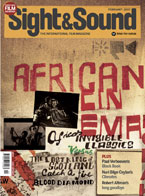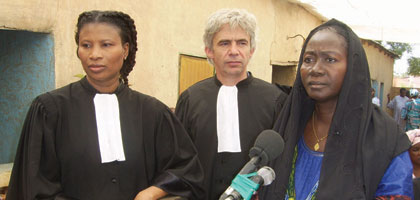Primary navigation


Have the monetary policies of the World Bank and the IMF helped or harmed Africa? Bamako puts the west on trial and shows how its greed and neglect have brutalised Malian lives. By N. Frank Ukadike
Abderrahmane Sissako's Bamako examines the ways globalisation has contributed to a process of effectively recolonising Africa through the snares of western financial institutions. A fictional docudrama filmed in a lucid and deceptively simple style, it is one of a number of African films to have made contemporary history their subject matter and the first since Le Franc (Djibril Diop Mambéty's whimsical but acerbic 1994 parable about the French government's devaluation of the West African franc by 50 per cent) to tackle the attitudes of the World Bank, the International Monetary Fund (IMF), G8 and the World Trade Organisation towards the continent.
Bamako literally puts the World Bank and the IMF on trial for instituting ruinous policies driven by Structural Adjustment Programmes (appropriately nicknamed SAPs in Nigeria) that are widely criticised for bringing more pain and harm than help to ailing economies. Africa is rich in natural resources, yet has been exploited, brutalised and impoverished: as Aminata Traoré, the former Malian minister of culture, argues in the film: "I am against the fact that Africa's main characteristic in the eyes of the world is its poverty. Africa is rather the victim of its wealth."
The film opens in a courtyard where an extraordinary legal trial is taking place against a background of children playing and women going about their everyday chores. As witnesses begin to present their cases, we are told of the suffering and hardship western financial institutions inflict on African people. We hear that for over two decades the World Bank and the IMF have forced governments to mortgage their economies to the west through demands for outrageously high interest payments - some countries have to spend up to one third of their GNP to service such loans. In addition, these institutions' insistence on cost-cutting measures such as the removal of government subsidies and the streamlining of the workforce help create intolerable living conditions: 5 million African children will die unnecessarily in the next five years, claims the prosecution. As witnesses continue to testify, it becomes clear that Africans have lost confidence in the west to the point of dismissing the recent promise to eradicate debt by the G8 nations at Gleneagles as "a false cancellation" that is no more than a masquerade of caring acted out to enhance their own reputations.
Sissako's film exemplifies a number of trends in contemporary African cinema. What might be described as the new pan-African aesthetic interweaves melodrama, politics, ideology, satire and comedy - and Sissako draws on all these conventions to produce a film that not only instructs but entertains. His previous features, Life on Earth (1998) and Waiting for Happiness (2002) combined creative modes of address and unconventional structures with the traditions of documentary and fictional cinema to challenge the very nature of representation. And now in Bamako he deploys a mix of comedic/satiric elements and political nuance to tell an African story in a recognisably African way as well as to increase his film's incisiveness and marketability.
Throughout the film Sissako eschews the Hollywood norms of narrative progression, instead introducing the stretching of time, the repetition of scenes or voices and nonsensical juxtapositions to draw attention to a distorted reality. An interspersed spoof Western starring Danny Glover and directors Elia Suleiman and Jean-Henri Roger serves as a metaphor for the narrow-mindedness of westerners' views of Africa. As Dziga Vertov said: "The problem is not to make political films but to make films politically."
Unlike in the traditional African chiefs' courthouses where societal feuds are settled or in the post-colonial magistrates' courts, the trial in Bamako shares its space with the families who live in the courtyard where it is held or who come there to fulfil daily obligations. Indeed, it is through the stories these people provide and the details of their everyday experience - a gun goes missing, a marriage is dissolved, a mother breastfeeds her baby, women dye fabric, a young man lies ill, and so on - that the political point is driven home. These vignettes of life have a documentary immediacy that contrasts with the formality of the trial sequences and offers an insight into Mali's resilient culture and the ways African society has responded to predatory globalisation and the economic adjustments demanded by the IMF.
As the trial goes on, Sissako uses cutaways to give us snapshots of the local inhabitants' lives. Nightclub singer Melé and her unemployed husband Chaka have a sick child. Their marriage is falling apart, but Melé self-centredly ignores her husband's attempts at reconciliation. Their relationship parallels that of the west and Africa: the west has never regarded Africa as a true partner, nor has it wished for Africa what it wishes for itself.
In the course of the proceedings we notice how everyone is affected or disaffected by the issues under discussion. While the courtyard's inhabitants are either indifferent, discouraged or so engaged with their own lives that they are often unable to follow the debate, several of the witnesses - all of them chosen by Sissako in the weeks before filming and asked to speak in their own words - give passionate testimonies. An elderly man who is not allowed to talk at the start of the session returns towards the end of the film to electrify the audience with a powerful chant in his native dialect that has all the ritualistic resonances of Souleymane Cissé's Yeelen (1987). There are no subtitles, but the pain on his face is eloquent in its own right. In another powerful sequence a schoolteacher testifies without words to show how deeply discouraged he is. These are just two examples of the disturbing images, situations and surprises Sissako's camera captures.
As a political drama, Bamako may appear overtly didactic. Yet the film compels the viewer to reflect on the issues it raises, entertains as it informs, and portrays the complex realities of contemporary Africa. It should not be misinterpreted as a simple diatribe against the west, but should be seen as part of a pan-African cinematic tradition of telling the truth - a truth that in this case replicates the complaints African specialists have been making against the west for some time. Colonialism, neocolonialism and now globalisation have left a gaping hole in the heart of a rich continent. It is to be hoped that in giving Africa a voice, Bamako will not be ignored.